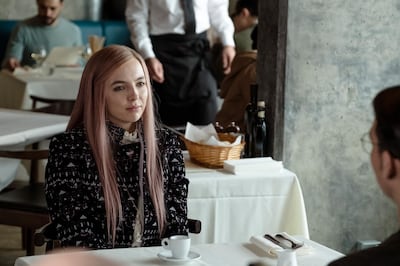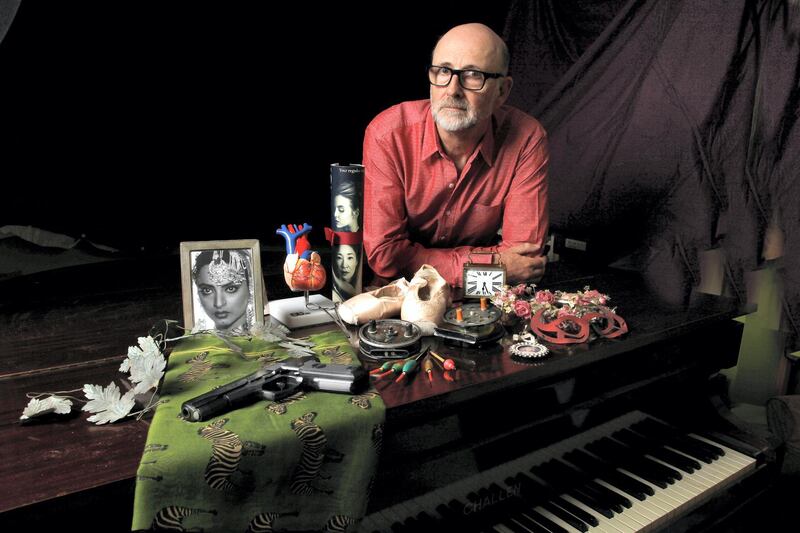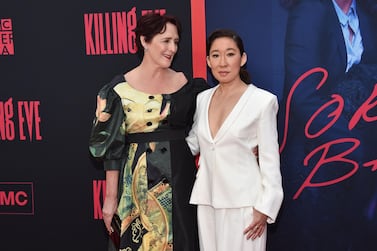When Luke Jennings was dancing his way across UK stages in his younger years it unlikely crossed his mind that he could one day be debating Russian assassins in Dubai. In some ways, the author has come full circle – returning to performing, of sorts – thanks to his ruthless, yet captivating, literary creation.
Ice-cold anti-heroine Villanelle is the protagonist in his novels that fuelled worldwide hit TV series Killing Eve and had Jennings entertaining audiences during the Emirates Airline Festival of Literature last week. "It never occurred to me that I might be coming to Dubai," says the British writer behind several admirable, though less commercially fortuitous tomes, before Villanelle pushed the bestseller button. "It's all very gratifying."
His books, Codename Villanelle and No Tomorrow, follow the generally violent antics of sassy, unflinching female assassin Villanelle, and Eve, an obsessive security agent tasked with stopping her. Their frantic activities had a contrastingly mild-mannered Jennings in Dubai for commitments that included a murder mystery dinner in which guests solved a crime while learning more about his modus operandi.
A huge fan of Ian Fleming's James Bond, Jennings felt compelled to counter a flood of troubled male thriller heroes who have followed 007. "I love the '60s glamour of Fleming's novels and the atmosphere surrounding them … they were full of wit, very elegant," he says. "A lot of thrillers have got formulaic with uninteresting central characters who seem to be drawn from the same mould; the jaundiced loner type, heavy, humourless, very technologically reliant.
All this kind of CIA operative stuff; grim, unsmiling, very macho – heavyweight cardboard characters chugging through their lives bogged down in their neurosis – always a broken marriage, a drink problem … the whole male-centred thriller had got very stale.”
Jennings's "antidote" emerged as four Kindle-edition novellas, appearing from 2014 and culminating in 2018's Codename Villanelle compilation, the basis for BBC America's TV series. Killing Eve: No Tomorrow landed last year and another sequel follows next month, called Killing Eve: Die For Me. Jennings, for one, appears reluctant to retire his mercurial assassin just yet, especially having reached his sixties before striking literary gold. Not that the years since stowing his Rambert dance shoes have been hollow.

Besides directing a documentary in Mumbai, he has worked extensively as a journalist for publications including Vanity Fair and The New Yorker around the world, including in Russia. He has also written dance-related content for Time magazine and was a dance critic for UK newspaper The Observer. His early novels tackled wide-ranging and contrasting subjects prior to Villanelle's arrival. His 1993 debut novel, Breach Candy, touches on some of his antecedence, incorporating a recently retired ballerina and a director researching in India. The 1995 follow-up, Atlantic, is an emotional story set two years after the Second World War about a schoolboy who is taken by his father on a transatlantic liner to New York for a heart operation. It was nominated for the Booker Prize. Beauty Story (1998) is about an actress who vanishes while filming a fragrance advertisement, and 2010's memoir Blood Knots: Of Fathers, Friendship and Fishing, centres on an intelligence officer killed in Ireland.
With Villanelle's antics taking off, Jennings has had to bow out of newspapers, having long combined his journalistic endeavours with writing books, a scenario he summed up perfectly in a column about himself: "I felt like Stalin, planning murder all day and watching Swan Lake in the evening."
Jennings co-wrote a ballet guide as Villanelle was emerging – and in it there's arguably a strong element of choreography in the way his characters dodge and collide as their unique relationship evolves. "There are quite a few elements of disguise and costume and performance, deception, it is quite theatrical," Jennings says while revealing writing aspirations surfaced even during his 10-year dance career touring theatres.
Subsequent years and life experience, from growing up during the Cold War to travelling extensively and meeting real security operatives, have fed his eventual destination. “You recognise these patterns in retrospect, when you look at the whole thing telescoped. It seems random at the time, but looking back, you see strands emerging.
“In the course of being a journalist I talked to people in the security services, special forces and the army.
Along the way you get things you later use. It's all material and if you've got a few more years on the clock, you've got more to draw on.
"In journalism you are absolutely confined to facts – but in fiction you can let go and let your imagination soar." That's certainly the case with Villanelle, a character he says "seemed like a lot of fun … powerful, completely irresponsible and funny" when she sprang to mind. "She lent herself to writing in a tongue-in-cheek sort of way," Jennings says. "And if you're having a good time writing, people will have a good time reading. They're serious [the novels], but the intention is to always make them enjoyable."
Slowly but surely the whole store is becoming obsessed with #KillingEve on @BBCAMERICA so now we're reading @lukejennings1's CODENAME: VILLANELLE, the novella collection that inspired the series. Pick up a copy today and tell us what you think! #bnbuzz #amreading pic.twitter.com/DyhyNEqqQL
— Barnes & Noble Ladue (@BnLadue) May 20, 2018
The author delved into that during his festival "in person" session on Saturday, alongside reaction to the screen adaptations. While some writers have had to surrender creative input, Jennings has had a fairly hands-on experience, in part due to his relationship with scriptwriter Phoebe Waller-Bridge of Fleabag fame. "She and I were on the same page and got on well from the start. We saw the characters the same way and had a lot of time to talk about them before Phoebe went off and wrote her pilot script [for Killing Eve].
“We would have long discussions about their motivations, their backgrounds. When she came to write the first series we had a shared understanding of these characters and how they would react in given situations. She saw the stories in the same way that I meant they would be seen.”
Jennings says his main pre-occupation was ensuring Eve (Sandra Oh) and Villanelle (Jodie Comer) remained true to themselves. "You're never going to love everything you see, but it takes 200 people to make a TV series and one person to write a novel, so it's a very different kind of animal," he says.
"There comes a point when you simply have to let go and let the TV series become what it's going to become."







